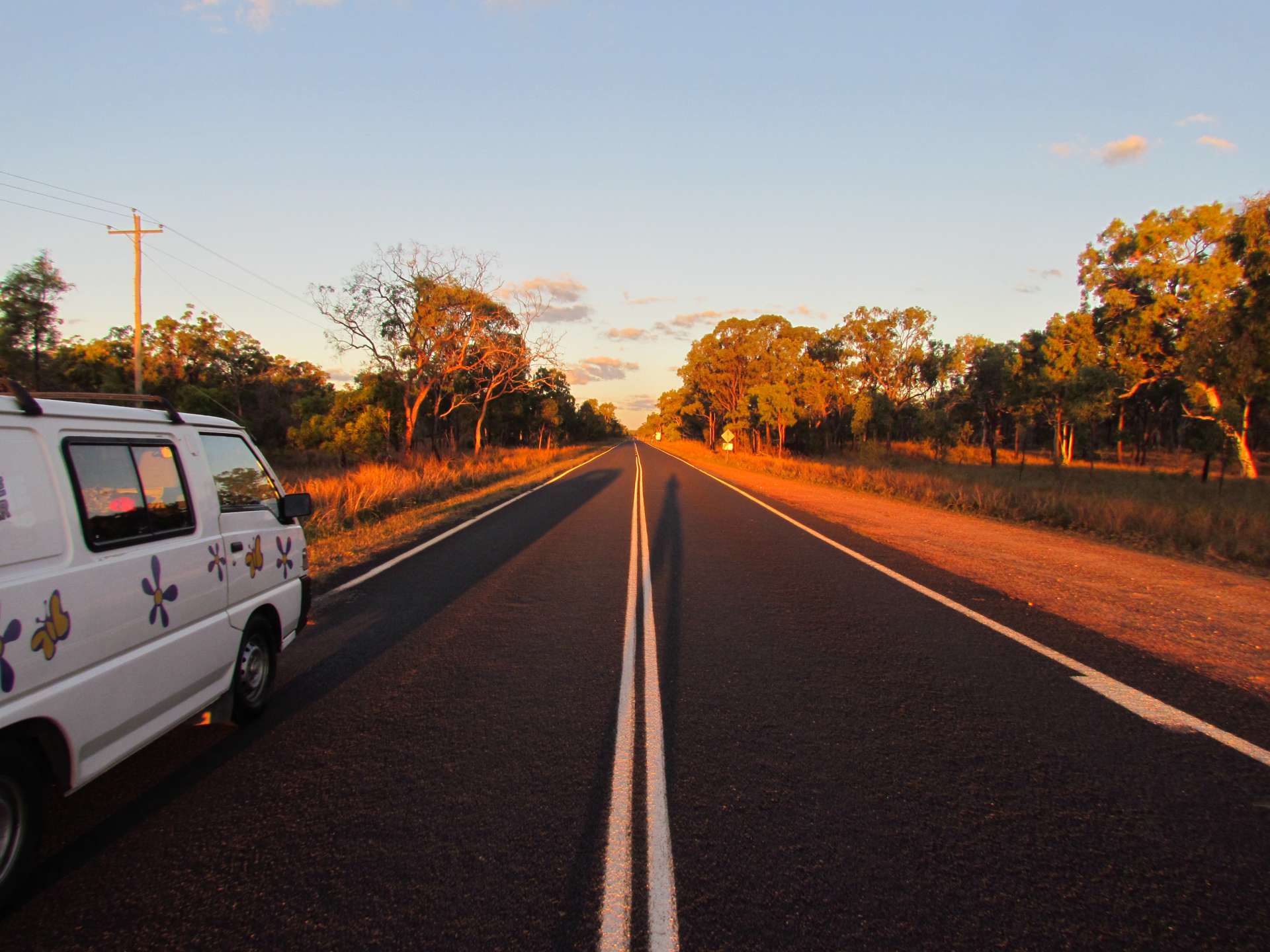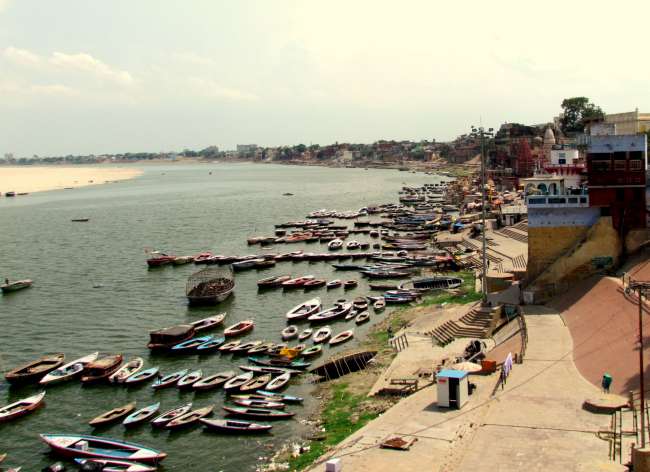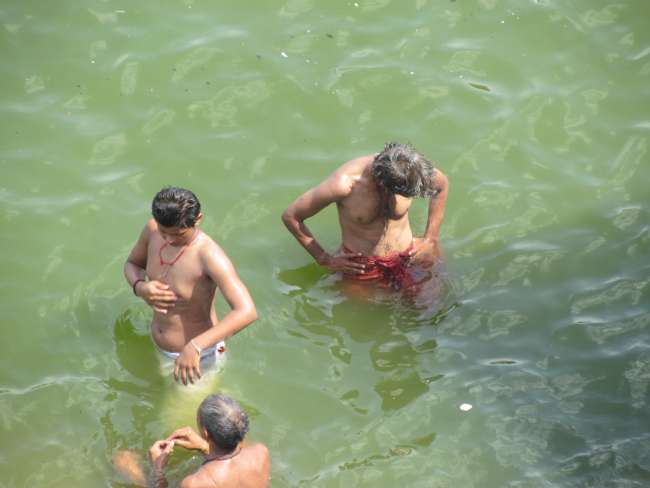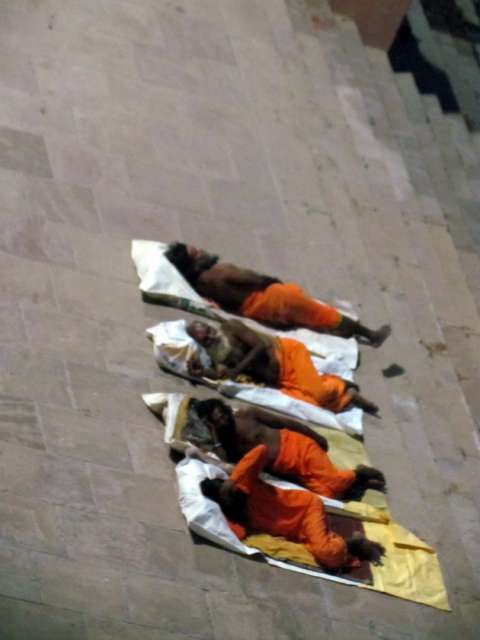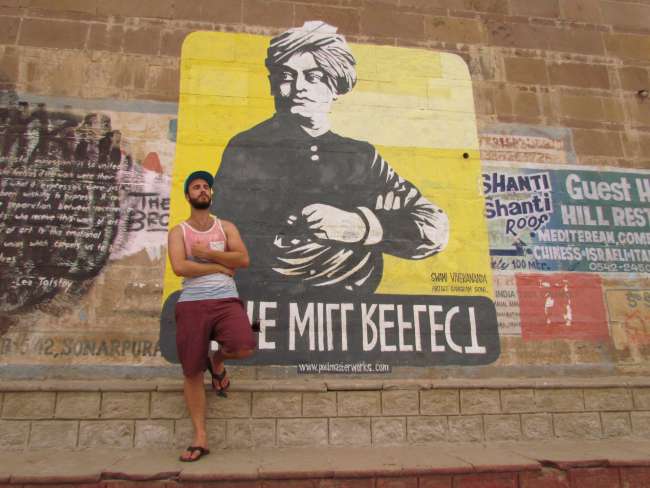Day 3: Not only the corpses burn
Buga: 13.07.2016
Biyan kuɗi zuwa Newsletter
7/3/2016
The night passes for me like in a sleep... uh Flight... no really... although there is no air conditioning and I stay in a double bed with my two ladies, I sleep like an Indian monk meditating. Unfortunately, the two beauties next to me do not. Obviously, it's too hot for them. Well, I'm probably hot.
Although the girls can't rest, we still manage to oversleep our alarm clock - which is illogical if you're not sleeping. Well, never mind! At 5:30... the sun has already risen... we realize 2 things. 1. That's it for today with the boat tour. 2. Montezuma's Revenge has hit me hard. And I mean really hard. The positive thing about it is that you lose any aversion to Indian toilets over time. The bad: well.. you know! At this moment, I'm not really burning for another visit to the toilet or spicy food. (Double meaning!)
Meanwhile, Hetti enjoys the peace and the wind on the terrace, our finance minister (according to her wishes) Gudi is tired but instead of sleeping, she is looking for ways to self-flagellate to atone for the lost 200 rp - due to missed boat tour.
After a good morning chai, Gudi and I take a walk along the Ganges riverbank. Hetti stays behind. What we see here is... and I'm used to a lot and I'm actually quite India-savvy... intense. People washing themselves and bathing in the Ganges and people washing clothes is one thing. But the fact that they do it while an bloated corpse floats 3 meters away from them (the Indians come here to die - more on that later) is far from any Western logic or hygiene awareness, but this is obviously not their strong suit. Instead, they have an immune system in which antibiotics are obviously already integrated.
Other than that, we see incredibly many different kinds of Indians. "Holy" ones (white beard, orange robe, sun-kissed, doing nothing), practicing yoga, old men with incredibly long beards reading newspapers, snake (cobra) charmers. I play a little soccer with small children, but since I'm from Austria, they win very soon. As a reward, a man comes over and massages my hands... oh God, that feels good. For a moment, I consider sending Gudi to him to learn his technique.
In general, the riverbank with its famous steps is very interesting and quite pleasant compared to Delhi. Although we get approached a lot, the phrase "No, thank you" is - compared to the capital - in the vocabulary and comprehension of the people of Varanasi - mostly. Only the thing with the corpse makes us hesitate and I seriously wonder about the origin of the water that ends up in my chai. (I looked it up, it's 70% from the Ganges - now I'm on a radical diet).
India is spontaneous - so is Babu (the seller from the day before). Suddenly, he is standing in front of us and really wants to show us the Burning Ceremony. We go with him. Apparently, one corpse per day is not enough for us at this point. The ceremony is a really hot affair - seen with a double meaning.
A short description of what we've seen here, followed by some cultural and spiritual aspects.
Our guide introduces us to an old man who introduces himself as a mortician but speaks good English. The man explains to me in incredible detail what is done with the dead. During the conversation, we are standing no more than 5 meters away from a fireplace, I can still see 2 feet, one of which seems to be moving (presumably due to the heat), which creates inner restlessness in me. After enjoying the 15-minute information session and sweating more than after a visit to a sauna (the combination of temperature - corpse heat - emotional chaos is certainly sweat-inducing), the old man leads me across ash and unidentifiable charred remains to a fire pit. There, he blesses us with the 3500-year-old fire of Shiva (it's raining like crazy right now, I'll have to check later if the fire is still burning). He charges us 500 rp to buy firewood... well, okay - all for the dead. By the way, Gudi is sitting on the sidelines during the mortician's lecture, but she almost throws up when she sees a dog chewing on a bone - unfortunately, it's predictable where the bone comes from. We soon retreat to our hotel, leave everything behind and take a short break.
Some interesting cultural facts:
- 1kg of wood costs 480 - 1200 rp (for the rich: sandalwood for 17,000).
- To make a fire, you need 150-200 kg, one cremation costs about 200,000 rp - which is around 3,000€ - an unimaginable amount here.
- Many can't afford it and just throw their corpses into the holy river.
- The funeral ceremony goes like this: the eldest son (father), youngest son (mother) or husband (wife) is the officiant. He goes to the Ganges, shaves off all his hair (including beard and eyebrows) and wears special robes. After the deceased is filled with 7 substances (of course, the deceased family member), a 2-3 hour cremation begins. The family members walk around the fire 5 times (5 elements). In the end, special morticians throw the hip bones of women or the breastbones of men into the river, as they do not burn as quickly.
- After 10 days of celebrations (during which the officiant must not change clothes or touch anyone), all the people return, shave off all their hair, and leave without looking back. This cuts off the dead's connection to the living. Absolutely no looking back!
- In general, women are not allowed, their tears extinguish the fire.
- The morticians search the ashes for gold and other belongings.
- Ordinary people are cremated in places separate from the rich or politicians.
- Holy people, those under 12 years old, and pregnant women are not cremated. They are considered innocent or holy.
- Those killed by cobra bites are also not cremated.
- The bodies that are excluded from cremation are simply tied to a stone and sunk.
After the ceremony, Babu picks us up and I have the honor of buying a pair of pants and a scarf in his shop. Now I look like a real backpacker (Gudi says like a real Saudi). I'm happy, Babu is happy, the finance minister is skeptical.
In general, it should be mentioned that Varanasi, although it shows much more exciting and disturbing images, is more pleasant than New Delhi. This may be due to the absence of constant street noise or hustle and bustle, but the possibility to retreat to the oasis of our hotel certainly contributes a lot. True India is good and pure fascination - but better in small doses.
Regarding my initial skepticism about scams and the tourist machinery: I have now understood that the people here are definitely spiritual and not pretending. No one would enter this river if they did not consider it holy deep within themselves, no matter how much money they were offered. I now believe that the Hindus see us Europeans as a source of money. Definitely, they lack a connection to our money. Sometimes, the sums demanded are absolutely absurd (boat trip for 100€/hour). They hardly have any connection to women. Only about 1/20 of the people on the street are women, my ladies are constantly stared at and photographed in disbelief, to which we respond by taking their picture as well. I am still annoyed by yesterday's temple visit. Although it was, like today, pure tourist exploitation, today I really had an experience, many glances, and impressions. Yesterday it felt like a forced situation that I got nothing out of - almost like a robbery. That's also the reason why I didn't just leave, it was simply almost impossible.
Now it's raining. I sit here, writing these lines, and thinking about the injustice of life. How is it possible that we have so much while the people here have nothing. And how is it possible that I don't give money to a man with several tumors on his face, but 500 rp for damn firewood. India is not easy to understand, even my own reactions to it are not.
For the rest of the afternoon, I let myself be persuaded to play cards with my entourage. The game Wizard is obviously for the gifted, as I win against my two ladies on the second try (although they have known the game for ages... hurray!) Other than that, we pass the time by eating, reading, writing this report, and sleeping. Except for reading and writing, it's exactly like the monkeys and cows here. Incredible amounts of sleep. I could sleep all the time. The whole experience is best processed in sleep. Somehow, in the last two days (thanks to our retreat), I feel like a light switch. After giving 100% and wanting to absorb everything, I'm just tired and sleep deeper than the calf of the cow in front of our doorstep, which I named Berta. Just to mention, the cow has ears like a dachshund, which amuses me several times a day. And there are no freckles on its face (which you might almost assume), there are incredibly many flies. There's also a goat that obviously owns the city, as it stands on its vantage point all day and looks very royal when it looks down on the common Indian people.
In the evening, we go to the daily celebration of the god ??? at the main ghat (a ghat is a staircase leading to the Ganges with a plaza, many gods have such a one, I want one too). There are masses of people and a certain fair atmosphere arises. One man sells glowing cow horns, another sells cotton candy. In between, you can hear prayers and ceremonies from loudspeakers. Of course, it wouldn't be India if there weren't cows lying around. Loads of cows. Huge bulls. When asked if they don't become aggressive too, everyone confirms. Well, great. I thought I was in Varanasi, not in Pamplona. I must say it's quite funny when a cow occupies a narrow alley and looks for food in the garbage can. However, squeezing past it (never push a cow in India, it's definitely higher up in the food chain than you) is not quite so fun.
Men constantly come by and offer a 6-minute massage of my hands for 20 rp (about 30 cents). I must admit, there's something appealing about it, but it's also disgusting, so I keep declining the offers for a long time. At some point, however, I give in, which results in me becoming quite stiff. In terms of muscles, that is. The massage, which takes place right on the steps, is not just a mutual exchange of sweat, the supposed masseur also tries to show off his osteopathic skills. Even though there was nothing to show off in the first place. This turns out to be the opposite. Neck pain. And I can't complain because Gudi had predicted exactly that. Double misery. Drama. Sigh.[1]
In the late evening, we try to make our way through the old town to the famous Blue Lassi Shop. Not that easy. The path turns out to be an obstacle course. If this were a video game, we would have already had several "Game Over" moments. But we keep overcoming various enemies such as motorcycles, bicycles, groups of people, cows, goats, dogs, and various excrements (which would certainly be bananas in Super Mario). However, the final boss is a group of about 30 people marching down the street, shouting and singing loudly, almost running, just as we stand in front of our destination - the Blue Lassi Shop. Damn, was a dead person just carried past us? And shouldn't they be sizzling away at the riverbank... probably after this (yes, this wording is irreverent - they let go of many things here). India keeps surprising. However, we can no longer overcome the final boss. Annoyed and no longer so fascinated by the shop's selection of 80 lassis, we turn back. A small note at this point. This shop also offers bang lassis. These are made with loads of hashish and similar miracle leaves. They are supposed to be quite strong. We don't dare to try them. Firstly, Varanasi is already quite a lot, and I'm sure cholera will break out in me soon. Secondly, even some Indians advise against it. Thirdly, I most certainly would not write about consuming it - greetings to the grandparents and moms in my distribution list.
So we go home, where I drift off like a young god and don't wake up a single time. I'm slowly getting used to the horrendous temperatures in my room. Actually, most Indians sleep on mattresses outdoors. But we don't really want to - at least the ladies don't. Hetti can't fall asleep. Too bad - she'll probably be quite grumpy tomorrow morning.
[1] NO!!! We're talking about a back massage here, even though the wording of this story may sound different in retrospect. A thank you to my editors Gudi and Hetti - I'll still write it that way.
Biyan kuɗi zuwa Newsletter
Amsa
